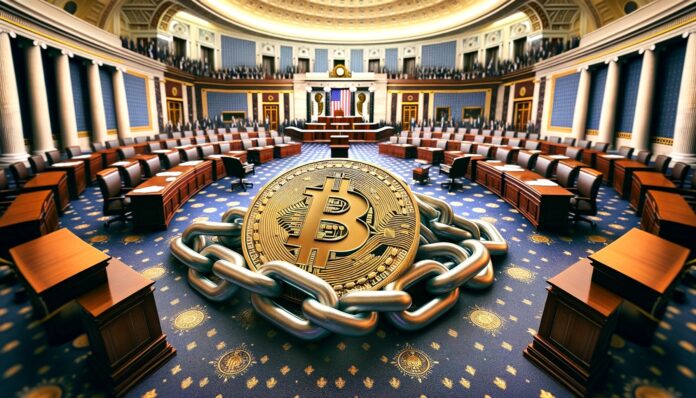Senator Elizabeth Warren (D-MA) announced an expanded coalition of Senate support this week for a bipartisan bill to mitigate illicit finance risks posed by cryptocurrencies.
Five additional senators have signed on as the bill’s cosponsors, including three members of the Senate Banking, Housing and Urban Affairs Committee — Senators Raphael Warnock (D-GA), Laphonza Butler (D-CA), and Chris Van Hollen of Maryland (D-MD). Senators John Hickenlooper (D-CO) and Ben Ray Luján (D-NM) also joined.
The Digital Asset Anti-Money Laundering Act seeks to bring the crypto ecosystem into greater compliance with anti-money laundering frameworks governing the traditional financial system.
According to the Treasury Department, digital assets have increasingly been used for money laundering, ransomware attacks, theft schemes, terrorist financing, and other criminal activity. A White House report last year found that in 2021, illicit crypto transactions reached $20 billion globally – an all-time high.
The bill
The bipartisan Digital Asset Anti-Money Laundering Act aims to regulate digital assets like cryptocurrencies to combat illicit finance risks. It would expand the definition of “financial institutions” overseen for anti-money laundering compliance to include cryptocurrency miners, hardware wallet providers, and independent blockchain validators that facilitate digital asset transactions.
Within 180 days, the Treasury Department must issue anti-money laundering regulations for these newly covered entities. The bill grants the Treasury the authority to require their registration with FinCEN. It also sets a one-year deadline for FinCEN to finalize pending regulations on transactions involving convertible virtual currencies.
Additionally, the legislation directs FinCEN to impose new reporting rules and transaction oversight measures related to digital currency mixers and anonymity-enhanced cryptocurrencies often used to obscure asset provenance. It tasks the Treasury with crafting regulations forcing financial institutions to establish risk controls surrounding interactions with anonymizing digital asset technologies.
The bill also outlines requirements for FinCEN, the Securities and Exchange Commission, and the Commodity Futures Trading Commission to develop specialized examination procedures assessing compliance with anti-money laundering rules among digital asset sector participants.
The problem
If passed as written, the Digital Asset Anti-Money Laundering Act could substantially impact Bitcoin. Designating Bitcoin miners, validators, and other network supporters as “financial institutions” would mandate their compliance with anti-money laundering rules and monitoring of the Bank Secrecy Act. This places new regulatory burdens and oversight on key players upholding the Bitcoin system. By directly targeting “anonymity enhanced cryptocurrencies” and leveraging mixing services to mask transactions, the bill also threatens Bitcoin’s privacy appeal through prohibitions on interacting with tools that preserve user anonymity.
Additionally, expanded powers for the Financial Crimes Enforcement Network over cryptocurrency exchanges may increase scrutiny and regulation of entry/exit points between Bitcoin and fiat money. New reporting requirements could make Bitcoin transactions more arduous. Some argue sweeping digital asset supporters like node operators and wallet providers into the expansive definition of financial institutions may discourage participation in Bitcoin infrastructure. Diminished decentralization could then undermine network resilience.
In essence, while the bill seeks to limit illicit uses of cryptocurrencies through strict anti-money laundering policies, imposed compliance challenges combined with reduced privacy and decentralization may simultaneously obstruct benign Bitcoin advancement and adoption.
The bipartisan bill reflects growing pressure to regulate cryptocurrencies amid widening adoption. Additional oversight aims to curb illicit uses while promoting accountability across the industry. Yet imposed regulations also risk hampering technological progress, spurring intense debate among lawmakers and tech leaders.
Credit: Source link






















 Bitcoin
Bitcoin  Ethereum
Ethereum  XRP
XRP  Tether
Tether  Solana
Solana  USDC
USDC  Dogecoin
Dogecoin  Cardano
Cardano  Lido Staked Ether
Lido Staked Ether  TRON
TRON  Chainlink
Chainlink  Avalanche
Avalanche  Wrapped Bitcoin
Wrapped Bitcoin  Wrapped stETH
Wrapped stETH  Stellar
Stellar  Sui
Sui  Toncoin
Toncoin  Hedera
Hedera  Shiba Inu
Shiba Inu  Litecoin
Litecoin  WETH
WETH  Polkadot
Polkadot  Hyperliquid
Hyperliquid  LEO Token
LEO Token  Bitcoin Cash
Bitcoin Cash  Bitget Token
Bitget Token  Uniswap
Uniswap  USDS
USDS  Wrapped eETH
Wrapped eETH  Ethena USDe
Ethena USDe  Pepe
Pepe  NEAR Protocol
NEAR Protocol  MANTRA
MANTRA  Official Trump
Official Trump  Ondo
Ondo  Aave
Aave  Aptos
Aptos  Internet Computer
Internet Computer  Monero
Monero  WhiteBIT Coin
WhiteBIT Coin  Mantle
Mantle  Ethereum Classic
Ethereum Classic  Bittensor
Bittensor  Cronos
Cronos  Dai
Dai  POL (ex-MATIC)
POL (ex-MATIC)  OKB
OKB 
